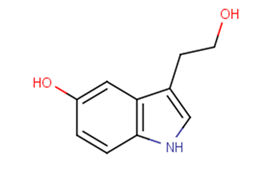
5-Hydroxytryptophol
CAS No. 154-02-9
5-Hydroxytryptophol( —— )
Catalog No. M20925 CAS No. 154-02-9
5-Hydroxytryptophol is a metabolite of tryptophan.?It is used as a biomarker for recent alcohol consumption and causes sleeping sickness
Purity : >98% (HPLC)
 COA
COA
 Datasheet
Datasheet
 HNMR
HNMR
 HPLC
HPLC
 MSDS
MSDS
 Handing Instructions
Handing Instructions
| Size | Price / USD | Stock | Quantity |
| 10MG | 35 | Get Quote |


|
| 25MG | 63 | Get Quote |


|
| 50MG | 110 | Get Quote |


|
| 100MG | 147 | Get Quote |


|
| 200MG | Get Quote | Get Quote |


|
| 500MG | Get Quote | Get Quote |


|
| 1G | Get Quote | Get Quote |


|
Biological Information
-
Product Name5-Hydroxytryptophol
-
NoteResearch use only, not for human use.
-
Brief Description5-Hydroxytryptophol is a metabolite of tryptophan.?It is used as a biomarker for recent alcohol consumption and causes sleeping sickness
-
Description5-Hydroxytryptophol is a metabolite of tryptophan.?It is used as a biomarker for recent alcohol consumption and causes sleeping sickness.
-
In Vitro——
-
In Vivo——
-
Synonyms——
-
PathwayProteasome/Ubiquitin
-
TargetEndogenous Metabolite
-
RecptorHuman Endogenous Metabolite
-
Research Area——
-
Indication——
Chemical Information
-
CAS Number154-02-9
-
Formula Weight177.2
-
Molecular FormulaC10H11NO2
-
Purity>98% (HPLC)
-
SolubilityDMSO:125 mg/mL (705.42 mM)
-
SMILESOCCc1c[nH]c2ccc(O)cc12
-
Chemical Name3-(2-hydroxyethyl)-1H-indol-5-ol
Shipping & Storage Information
-
Storage(-20℃)
-
ShippingWith Ice Pack
-
Stability≥ 2 years
Reference
1.Spies C D Herpell J Beck O et al. The Urinary Ratio of 5-Hydroxytryptophol to 5-Hydroxyindole-3-Acetic Acid in Surgical Patients with Chronic Alcohol Misuse[J]. Alcohol 1999 17(1):19-27.
molnova catalog



related products
-
3-Hydroxymandelic Ac...
3-Hydroxymandelic Acid is a metabolite of Phenylephrine.
-
5-Phenylvaleric Acid
5-Phenylvaleric acid is a pentanoic acid of bacterial origin occasionally found in human biofluids.
-
1-Hydroxypyrene
1-Hydroxypyrene, a biomarker of exposure to polycyclic aromatic hydrocarbons, is analyzed in urine samples.



 Cart
Cart
 sales@molnova.com
sales@molnova.com


